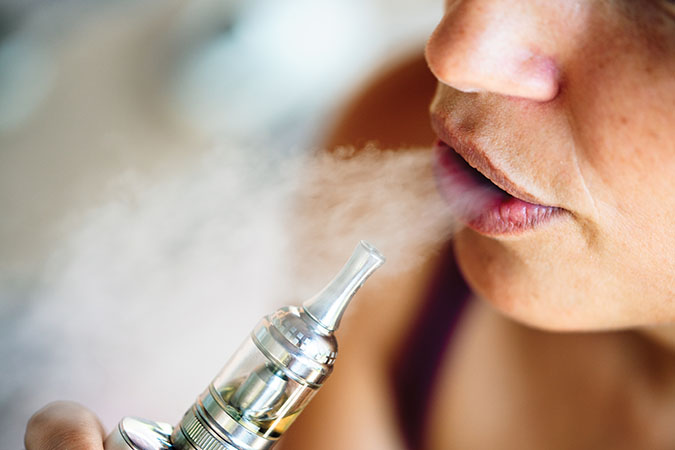
Vaping is the use of e-cigarettes to inhale an aerosolized liquid into your lungs.
The vaping liquid may contain nicotine, tetrahydrocannabinol (THC –
the main psychoactive ingredient of cannabis or marijuana), hemp oil,
and other flavorings and additives. The nicotine in vaping products is
highly addictive and the extra strength cartridges contain more nicotine
than smoking tobacco products. For example, the amount of nicotine in one
JUUL pod is equivalent to one pack of cigarettes.
Nicotine can raise your heart rate and blood pressure putting you at increased
risk for heart disease and stroke. THC and hemp oil can also increase
heart rate and blood pressure, cause intense nausea, vomiting and breathing
difficulties. Additionally, these chemicals can lower the learning ability
of teenagers, cause mental illness, and lead to child development problems
during and after pregnancy.
Recently, the
Centers for Disease Control and Prevention (CDC) identified vitamin E acetate, used as a thickening agent in THC-containing
vaping products, as a chemical of concern among patients with “vaping
product use associated lung injury” (EVALI). So far there have been
over 2,000 reported EVALI cases (95% were hospitalized due to the severity
of illness) and 47 deaths.
Vaping products containing THC should not be used by anyone. Adults who
do not currently use tobacco products should not start vaping. Adults
who use vaping to quit smoking should not go back to smoking and instead
utilize other U.S. Food and Drug Administration approved
nicotine replacement strategies. Those currently vaping should strongly consider stopping. If they choose
to continue vaping, they should closely monitor themselves for cough,
shortness of breath and chest pain and see a healthcare provider immediately
if they develop any of these symptoms.
The bottom line: vaping products should never be used by youths, young
adults or pregnant women.
Dr.
Michael Nolledo sees
Pulmonology and Sleep Medicine patients in his practice, which is with the Third Floor Clinics at
Campbell County Memorial Hospital, 501 S. Burma Avenue, Third Floor South. Appointments available by calling
307.688.3615. Learn more at
www.cchwyo.org/pulmonary.